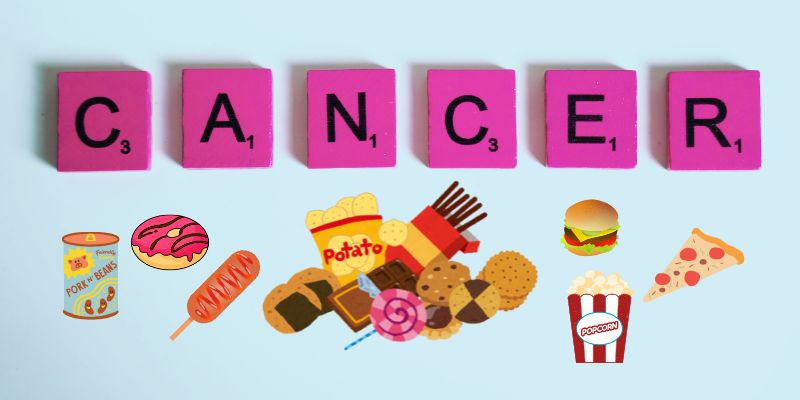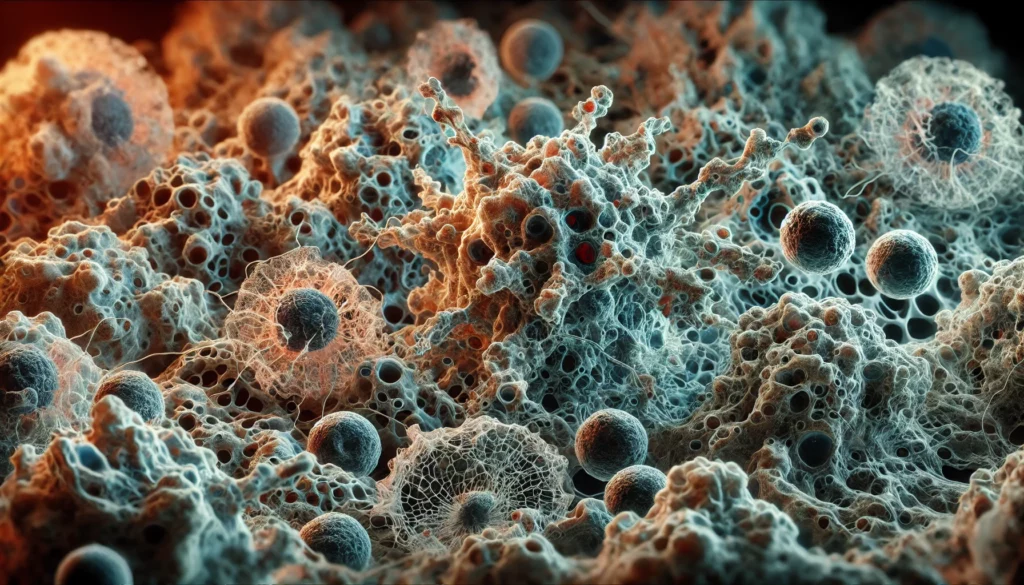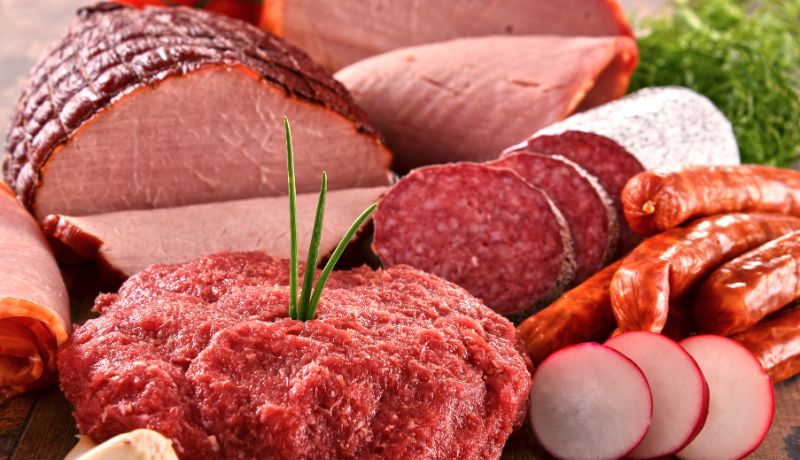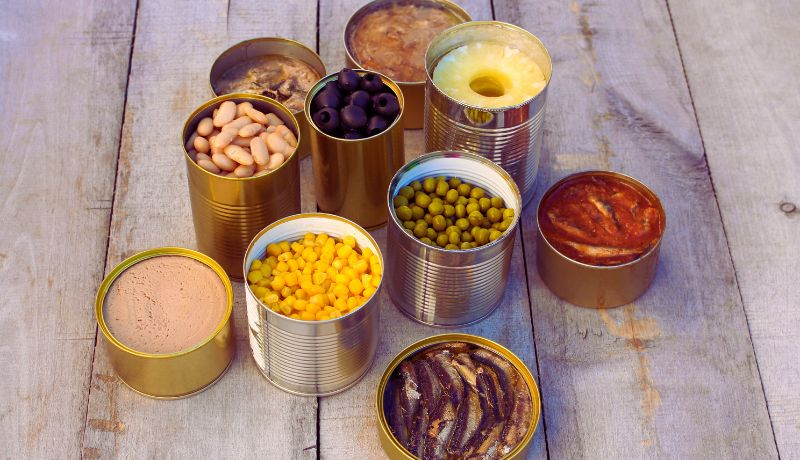
Unhealthy eating habits can significantly increase the risk of chronic diseases, including cancer. While no single food can entirely prevent or cause cancer, certain dietary choices have been linked to an increased risk.
This article dives into the top five cancer-causing foods you should minimize or avoid to promote a healthier lifestyle.
What is Cancer?
Cancer, often referred to as the “Big C,” is a group of diseases characterized by the uncontrolled growth of abnormal cells in the body.
These cells can form masses called tumors, which may be either benign (non-cancerous) or malignant (cancerous).

Malignant tumors have the ability to invade surrounding tissues and spread to other parts of the body through a process called metastasis.
Metastasis occurs when cancer cells travel via the bloodstream or lymphatic system to form new tumors in different organs. For example, if breast cancer spreads to the lungs, the new tumor in the lungs is still composed of breast cancer cells.
Understanding cancer’s behavior is critical to managing its risks.
Cancer and Food
Did you know that nearly half of all cancer cases in the United States are preventable through lifestyle changes, especially dietary habits?
While there isn’t a specific diet that can eliminate cancer risk, choosing the right foods and avoiding harmful ones can make a significant difference.
Here are the top five cancer-causing foods to watch out for:
1. Processed Meats (Hot dogs, Ham and Bacon)
Processed meats are classified as Group 1 carcinogens by the International Agency for Research on Cancer (IARC), based on evidence linking them to colorectal cancer.
These meats often contain additives like potassium nitrate and sodium nitrite, which can form cancer-causing compounds called nitrosamines during processing and cooking.
Nitrosamines are particularly harmful because they can directly damage the cells lining the bowel, increasing the risk of mutations that lead to cancer.

Research suggests that consuming just 50 grams of processed meat daily—equivalent to two slices of bacon or one hot dog—can increase bowel cancer risk by 18%.
To reduce your risk, consider replacing processed meats with lean protein options like poultry, fish, or plant-based alternatives such as legumes and tofu. When indulging in processed meats occasionally, balance your diet with plenty of fresh fruits and vegetables to offset potential harm.
2. Microwave Popcorn
While air-popped popcorn can be a healthy snack, microwave popcorn poses health risks due to its packaging and artificial butter flavoring. The bags are often lined with chemicals such as perfluorooctanoic acid (PFOA), which can leach into the popcorn during cooking.
Additionally, artificial flavorings like diacetyl have been linked to respiratory issues and potential cancer risks.
Diacetyl, the compound responsible for the buttery aroma, has been associated with a condition known as “popcorn lung,” a rare but serious lung disease. Moreover, PFOA exposure has been linked to various cancers, including kidney and testicular cancer, in animal studies.
For a safer alternative, make your own popcorn using organic kernels and a brown paper bag. Simply season it with natural ingredients like olive oil, sea salt, or nutritional yeast for a healthy and delicious treat.
3. Fried and Starchy Foods
Foods like fries, chips, and doughnuts contain a chemical called acrylamide, which forms when starchy foods are cooked at high temperatures through frying, baking, or roasting. Acrylamide has been shown to cause cancer in animal studies, and while human studies are ongoing, health experts recommend caution.
Acrylamide forms as part of the Maillard reaction, which gives browned foods their distinctive flavor and color. High levels of this chemical are commonly found in overcooked or heavily browned foods.

Consuming these foods frequently may increase the risk of cancers, particularly of the gastrointestinal tract.
To reduce exposure, cook starchy foods to a golden yellow rather than a dark brown, and avoid overcooking or burning. Opt for healthier preparation methods like boiling or steaming, and incorporate whole grains, fresh vegetables, and healthy fats into your meals for balanced nutrition.
4. Refined Sugar
Excessive sugar consumption is associated with obesity, a major risk factor for several types of cancer, including breast, colorectal, and pancreatic cancers.
Refined sugars, such as those found in table sugar, candies, and sodas, can contribute to inflammation and insulin resistance, creating an environment that promotes cancer cell growth.
Cancer cells are known to consume glucose at a faster rate than normal cells, a phenomenon first observed by Nobel laureate Otto Warburg. High Fructose Corn Syrup (HFCS), a common sweetener in processed foods, is particularly concerning because it is rapidly metabolized by cancer cells, fueling their growth.
To limit refined sugar intake, choose natural sweeteners like honey, maple syrup, or stevia in moderation. Incorporate whole fruits for natural sweetness and enjoy desserts made with nutrient-dense ingredients like dark chocolate, nuts, or Greek yogurt.
5. Canned Goods
Many canned foods contain bisphenol A (BPA), a chemical used in the lining of cans to prevent corrosion and bacterial contamination. BPA can leach into the food, especially when the contents are acidic (e.g., tomatoes), fatty, or processed.
BPA exposure has been linked to hormonal disruptions and an increased risk of breast, prostate, and other cancers.

Consuming canned foods regularly may also lead to other health concerns, such as infertility, obesity, and neurological issues. Unfortunately, consumers cannot assess BPA levels just by looking at packaging, making it challenging to avoid.
To minimize exposure, prioritize fresh or frozen foods and choose products packaged in glass or BPA-free containers. When buying canned items, look for labels that explicitly state “BPA-free.”
Conclusion
Making informed dietary choices can significantly reduce your cancer risk.
While there’s no guarantee of being completely cancer-free, adopting healthier eating habits, staying active, and avoiding these cancer-causing foods can reduce your risk by over 50%.
Remember to prioritize fresh, whole foods and consult with healthcare professionals for personalized advice.
Small, consistent changes in your lifestyle can have a big impact on your overall health, helping you lead a longer, healthier life.

This was a really informative article, nice research! I like that it’s to the point. I’ve always known that those foods were bad and should be avoided, but the way you’ve laid it out is easy to understand. Is opting for uncured bacon a better way to go? I love ham and pork hocks in my beans, I would hate to have to give that up!
Hi Alisia,
Thank you for stopping by and leaving a comment. Who doesn’t love ham and bacon? I’d be lying if I say that I have totally eliminated them from my diet. But as I always say, we can eat anything we want; we just need to eat them in moderation.
What about uncured bacon? I think that’s a brilliant idea! I haven’t thought of that as a much healthier option. However, I still do not advise consuming more of it than necessary because of the salt and saturated fats it contain. The only difference between cured and uncured bacon is that the latter does not contain nitrites.
So true, that these foods are all so terrible for us. But sometimes I just can’t help myself, like when I see ham or hotdog, I will crave the saltiness of it. It’s once in a blue moon, but still one time too many.
Thank you for the great article, it’s a timely reminder.
To be honest, I also eat hot dogs, ham and bacon. How can I not when this is the typical breakfast for most people. But like I said, the key is moderation. We do not have to totally eliminate them from our diet. We’ll just have to make sure we are eating larger portions of healthy and nutritious foods. We must have definite boundaries and know how much is too much.
We do not want to stuff our bodies with unhealthy foods all the time because at the end of the day we will have to pay the price. Let us always be reminded that health is wealth and our diet plays a major part in our goal of staying fit and healthy and in avoiding cancer.
Hi there. I am also a “healthy activist”. I never use the microwave for anything! I’m sure a lot of people will be surprised by microwaved popcorn. I agree with your top 5 foods to avoid to reduce risk of cancer and I hope people start to make changes. Processed food (whether meat or vegetables) are indeed harmful. Unfortunately so much of the food we buy in the supermarket is processed or packaged with harmful chemicals. Thanks for your research.
Practicing a healthy lifestyle can be a real challenge especially when it comes to food. That’s why not many people are willing to change their eating habits.
Unlike before when there were no processed foods, people were much healthier and they even lived up to 100-120 years old.
Nowadays we’re not sure anymore if there are healthy foods sold in the market, that’s why natural and organic foods are still the best choices if we want to stay away from the Big C.
Thank you for sharing this valuable information.
Quite alarming, the 2 main ones I learned from:
1) Processed Meats (Hot dogs, Ham and Bacon)
I had better watch out in any pizza choices, so really need to be vigilant in choosing pizza toppings
5) Canned Goods – BPA
You highlight that people pretty well can’t buy stuff in cans, cans are everywhere and many people would fall into this convenience trap.
2 Questions – Are there ANY cans that are safe? how can these be identified?
Hello John, thanks for dropping by and thanks for your comment.
I do not think there are canned goods that do not have Bisphenol A. BPA is incorporated in all tin cans to prevent metal corrosion and breakages. It is also needed to preserve the food and prevent bacterial contamination.
However, there are canned foods that contain lower and greater concentrations of BPA. This information should help consumers in making decisions as to which canned products they choose to buy. According to a study published in the Environmental Research Journal, canned soups and pasta can expose consumers to higher BPA concentrations than canned fruits and vegetables.
It was found out in a research study that eating canned soup resulted in 229% higher concentration of BPA compared with consuming no canned foods; canned pasta resulted in 70% higher concentrations and canned fruits or vegetables resulted in 41% higher concentrations. The reason for this is the heating time for soups when processed. Canned soups usually need longer heating time to get sterilized.
So basically, eating a single can of cream of mushroom soup exposes you to higher concentrations of BPA than eating 3 cans of peaches.
In order to avoid exposure to BPA, we must choose fresh, unpackaged foods whenever possible.
Great article, love all the valuable information. I think so many of us need to learn about cancer and how we can help prevent it early on in life. So many of us are surrounded by loved ones who are going through this battle and it’s so sad to see just how many people it has affected.
Hi Linsey, thanks for your comment.
I can imagine how difficult it must be to have a loved one battle against against cancer. It’s even more difficult because other than being there for them, there’s really not much we can do to help. Good thing, there are organizations/agencies who are trying all they can to get the message across to everyone on what cancer is all about and what we can all do so we do not have to go through what others have gone through.
Like I said in my article, unhealthy eating is one major risk factor not only for chronic diseases like diabetes and hypertension but also cancer. Eating a healthy, balanced diet will greatly reduce our risk of developing cancer of any sort. I just hope that more people will become aware of the bad effects of these foods to their health, no matter how enticing they maybe.
Great job with this article. I think a lot of people eat all of this on day to day basis. They say “You are what you eat.” Once I got that one fixed in my mind I changed my diet completely. Reading your article just reinsures me that I did a great decision. Thanks for sharing. All the best!
Ivan
Hi Ivan, I wanna commend you for changing your diet. It must have been hard at first but let me reassure you that it’s a decision you will never regret. As the saying goes, “Health is wealth.”
Hi Alice,
Great article! I was diagnosed with prostate cancer some 6 years ago now and despite my doctors protestations I went down the alternative plant based path. I gave up meat and dairy, ate a plant based diet regime, lots of fasting, juicing, meditation, fresh air, sunshine and exercise. I am now healthier than ever.
We need more people to read articles like yours. So many people just don’t care and think they are bullet proof. I will share your article and get the word out there, cheers,
Kev
Hi Kev, thanks for sharing your story.
Although not all doctors agree that changing your diet will have a huge impact on your health, at the end of the day, it’s your body, your health, so you get to choose what treatment you think is best for you.
You’re right, people don’t care anymore what kinds of foods they stuff into their mouth, as long as they’re satisfied.
Thanks for sharing this article. We really need to continue getting the word out there that there is a huge price to pay for eating unhealthy foods.
You have shocked me with regards to the potential dangers Bisphenol A delivers to canned foods. We seem to have a problem with anything man-made these days. Everything natural is healthy but there’s no money to be made, hence our ignorance.
Previously, I was a butcher and we were continuously bullied by the media concerning cancer scares with bacon.
Learning the role at college, we were informed the ‘safe’ (?) sodium nitrate when mixed with the meat proteins formed sodium nitrite when curing which produced bacon’s attractive pink appearance. A cure without the addition of sodium nitrate would leave the bacon an unattractive grey colour with a deceiving ‘off’ look.
The same predicament & health scare affected burgers & sausage where man-made colouring was added purely to produce an appetizing appearance. Although natural colours have now been introduced, previously the absence of colouring produced left an unappetizing grey colour, enough to stop sales.
I think our next cancer scares will involve man-made pharmaceuticals. Most of us continuously ignore everything inexpensive & healthy, growing around us. Experts & media hey?
Simon.
Hi Simon, thanks for your comment.
You’re absolutely right, anything man-made seems to have undesirable effects on us. We live in a fast-paced society, hence we want everything instant if possible, especially when it comes to food. We are so busy making money and securing for ours and our kids’ future that we do not have time anymore to prepare healthy meals. Who doesn’t love ham, bacon and hotdogs? Other than the fact that they taste really good, they are also easy to prepare.
For food manufacturers, it’s all about the money. They do not consider the negative effects that their products might have on the consumers. That is why it is very important that shoppers and consumers always opt for natural and healthy foods.
Just the thought that man-made pharmaceuticals will eventually become the next “cancer scare” is really alarming.